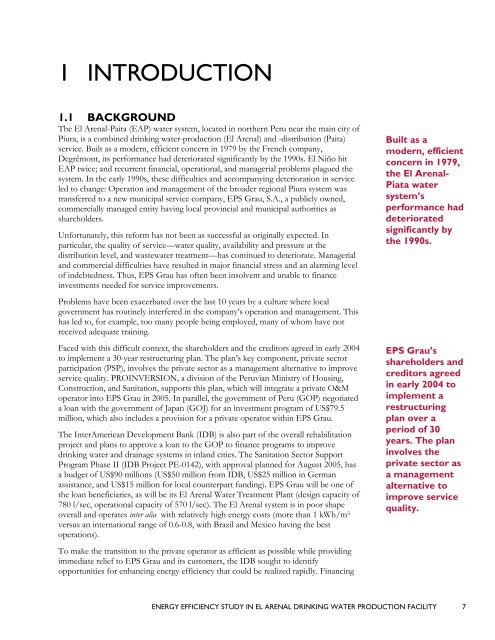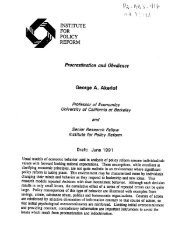Electrical - usaid
Electrical - usaid
Electrical - usaid
Create successful ePaper yourself
Turn your PDF publications into a flip-book with our unique Google optimized e-Paper software.
1 INTRODUCTION<br />
1.1 BACKGROUND<br />
The El Arenal-Paita (EAP) water system, located in northern Peru near the main city of<br />
Piura, is a combined drinking water-production (El Arenal) and -distribution (Paita)<br />
service. Built as a modern, efficient concern in 1979 by the French company,<br />
Degrémont, its performance had deteriorated significantly by the 1990s. El Niño hit<br />
EAP twice; and recurrent financial, operational, and managerial problems plagued the<br />
system. In the early 1990s, these difficulties and accompanying deterioration in service<br />
led to change: Operation and management of the broader regional Piura system was<br />
transferred to a new municipal service company, EPS Grau, S.A., a publicly owned,<br />
commercially managed entity having local provincial and municipal authorities as<br />
shareholders.<br />
Unfortunately, this reform has not been as successful as originally expected. In<br />
particular, the quality of service—water quality, availability and pressure at the<br />
distribution level, and wastewater treatment—has continued to deteriorate. Managerial<br />
and commercial difficulties have resulted in major financial stress and an alarming level<br />
of indebtedness. Thus, EPS Grau has often been insolvent and unable to finance<br />
investments needed for service improvements.<br />
Problems have been exacerbated over the last 10 years by a culture where local<br />
government has routinely interfered in the company’s operation and management. This<br />
has led to, for example, too many people being employed, many of whom have not<br />
received adequate training.<br />
Faced with this difficult context, the shareholders and the creditors agreed in early 2004<br />
to implement a 30-year restructuring plan. The plan’s key component, private sector<br />
participation (PSP), involves the private sector as a management alternative to improve<br />
service quality. PROINVERSION, a division of the Peruvian Ministry of Housing,<br />
Construction, and Sanitation, supports this plan, which will integrate a private O&M<br />
operator into EPS Grau in 2005. In parallel, the government of Peru (GOP) negotiated<br />
a loan with the government of Japan (GOJ) for an investment program of US$79.5<br />
million, which also includes a provision for a private operator within EPS Grau.<br />
The InterAmerican Development Bank (IDB) is also part of the overall rehabilitation<br />
project and plans to approve a loan to the GOP to finance programs to improve<br />
drinking water and drainage systems in inland cities. The Sanitation Sector Support<br />
Program Phase II (IDB Project PE-0142), with approval planned for August 2005, has<br />
a budget of US$90 millions (US$50 million from IDB, US$25 million in German<br />
assistance, and US$15 million for local counterpart funding). EPS Grau will be one of<br />
the loan beneficiaries, as will be its El Arenal Water Treatment Plant (design capacity of<br />
780 l/sec, operational capacity of 570 l/sec). The El Arenal system is in poor shape<br />
overall and operates inter alia with relatively high energy costs (more than 1 kWh/m 3<br />
versus an international range of 0.6-0.8, with Brazil and Mexico having the best<br />
operations).<br />
To make the transition to the private operator as efficient as possible while providing<br />
immediate relief to EPS Grau and its customers, the IDB sought to identify<br />
opportunities for enhancing energy efficiency that could be realized rapidly. Financing<br />
Built as a<br />
modern, efficient<br />
concern in 1979,<br />
the El Arenal-<br />
Piata water<br />
system’s<br />
performance had<br />
deteriorated<br />
significantly by<br />
the 1990s.<br />
EPS Grau’s<br />
shareholders and<br />
creditors agreed<br />
in early 2004 to<br />
implement a<br />
restructuring<br />
plan over a<br />
period of 30<br />
years. The plan<br />
involves the<br />
private sector as<br />
a management<br />
alternative to<br />
improve service<br />
quality.<br />
ENERGY EFFICIENCY STUDY IN EL ARENAL DRINKING WATER PRODUCTION FACILITY 7

















